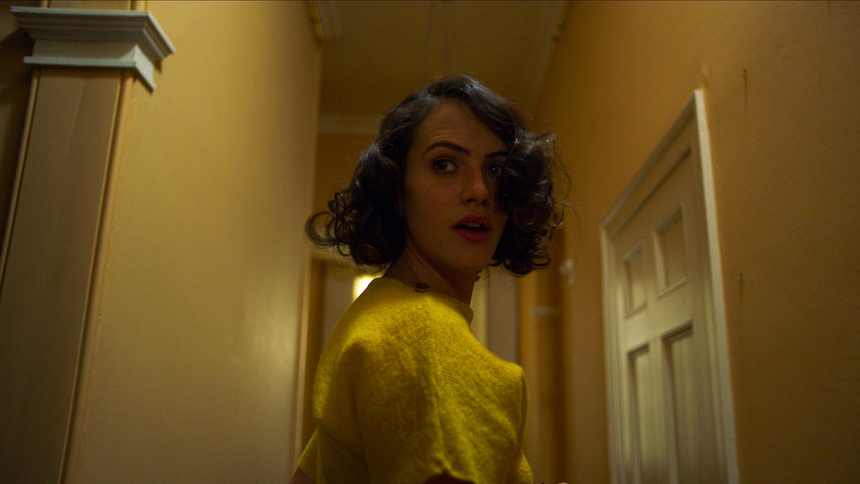Review: THE BANISHING, Period Supernatural Horror Delivers Slow-Burn Chills

There’s an intriguing moment in director Christopher Smith’s (Black Death, Triangle, Severance, Creep) latest contribution to the supernatural horror sub-genre, The Banishing: Harry Price (Sean Harris, committed in every sense of the word), a seedy, small-town occultist with a bad dye job and a marked lack of concern for his personal safety, comforts a newly murdered woman, gently lowering himself to the blood-stained ground and lying down next to her her, ushering her soon-to-depart soul to the next world with a solemn benediction of decidely non-Christian origin. Both an eccentric gesture and oddly poignant, Price’s personal gesture stands in stark contrast against the remainder of a frustrating genre entry that simultaneously tries too hard, cramming enough ideas for several films or even a miniseries, and doesn’t try hard enough, reverting to over-familiar tropes and surprise-free revelations about the supernatural menace threatening The Banishing's central characters.
Set in the late ‘30s as the rise of Hitler and fascism in Germany portends a second, devastating world war and the deaths of millions, The Banishing centers on Marianne Forster (Jessica Brown Findlay), her psychically attuned preteen daughter, Adelaide (Anya McKenna-Bruce), and Marianne’s husband, an Anglican minister. He has been newly promoted to overseeing Morley Rectory/Hall (Borley Rectory/Hall in the real world, once considered "the most haunted house in England"), a forbidding, foreboding, Protestant edifice abruptly abandoned three years earlier by the previous vicar and his wife. At least that’s the general story Linus’s authoritarian superior, Bishop Malachi (John Lynch), has embraced as the official record to avoid even the hint of scandal. For Linus, Morley Rectory represents a fresh opportunity to prove himself a capable vicar, religious leader, and mentor to a spiritual flock numbering in the single digits. Linus’s reactionary views on sex (Christianity equating sexual congress with damnable sin), sexual jealousy, and neurotic possessiveness, naturally put him at repeated odds with the free-spirited, sensual Marianne and her understandable desire for a physically intimate relationship.
What passes for freedom in Marianne’s limited world obviously isn’t. She’s circumscribed by her dual roles as the public-facing wife of a parish vicar and a mother to a moody, unhappy preteen. It’s a decision, however, she’s made under no amount of societal duress, obviously marrying Linus in exchange for the respectability he offers both Marianne and the fatherless Adelaide (born out of wedlock, a social and religious sin worthy of ostracism and exile in ‘30s England). That respectability means nothing, of course, once things start to go predictably bump in the night, Adelaide begins playing with creepy dolls she finds in a dusty armoire, and an imaginary friend enters Adelaide’s otherwise friendless life. Leaving no genre trope or convention unused, The Banishing turns in part on spooky, inter-dimensional mirrors inconveniently scattered around the rectory. (Cue comparisons to The Haunting, The Innocents, The Shining, and The Others, among others.)
Add to The Banishing a few loosely connected ideas, including a misogynistic, sado-masochistic sect, occult-curious Nazis searching for a supernatural edge as world war looms, and Marianne’s increasingly fractured mind — eerily depicted by Marianne entering slipping into the recent past or near future as both observer and actor — and the stage is set for what should be a third act filled with psyche-scarring images, an overabundance of chills, if not outright jump scares (Smith seems ideologically opposed to them), and a searing, cathartic finale where Marianne, confronting her personal demons along with the rectory’s hungry, restless ghosts, finds a healthy path toward healing from unresolved trauma and becomes a better person in the process.
Unfortunately, The Banishing doesn’t quite there, limping through a series of increasingly daft, borderline incoherent scenes, each one less tense or suspenseful than the last, before ending on a completely gratuitous, unearned plot turn that, intentionally or not, cheapens Marianne’s personal journey in exchange for an unnecessary sequel-ready jolt that all but undermines everything that precedes it. Still, Smith deserves credit for wringing every iota of mood and atmosphere from Morley Hall’s labyrinthine hallways, underground passageways, and sprawling, shadow-filled rooms. Practically a character in its own right (a cliche, certainly, but true here), Morley Hall is a triumph of interwar production design, irresistibly creepy and paradoxically appealing in equal measure.
The Banishing is available to stream via Shudder.
The Banishing
Director(s)
- Christopher Smith
Writer(s)
- David Beton
- Ray Bogdanovich
- Dean Lines
Cast
- Jessica Brown Findlay
- John Heffernan
- Anya McKenna-Bruce







